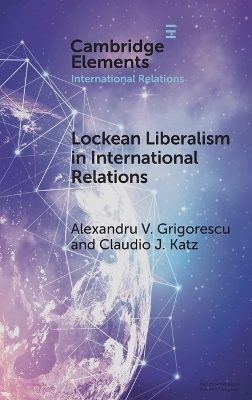
Lockean Liberalism in International Relations
Seiten
2024
Cambridge University Press (Verlag)
978-1-009-51700-3 (ISBN)
Cambridge University Press (Verlag)
978-1-009-51700-3 (ISBN)
This Element applies a new version of liberalism to international relations (IR), one that derives from the political theory of John Locke. The authors tease out the “realist” elements from his political writings: his emphasis on politics, power, and restraints on power.
This Element applies a new version of liberalism to international relations (IR), one that derives from the political theory of John Locke. It begins with a survey of liberal IR theories, showing that the main variants of this approach have all glossed over classical liberalism's core concern: fear of the state's concentrated power and the imperative of establishing institutions to restrain its inevitable abuse. The authors tease out from Locke's work its 'realist' elements: his emphasis on politics, power, and restraints on power (the 'Lockean tripod'). They then show how this Lockean approach (1) complements existing liberal approaches and answers some of the existing critiques directed toward them, (2) offers a broader analytical framework for several very different strands of IR literature, and (3) has broad theoretical and practical implications for international relations.
This Element applies a new version of liberalism to international relations (IR), one that derives from the political theory of John Locke. It begins with a survey of liberal IR theories, showing that the main variants of this approach have all glossed over classical liberalism's core concern: fear of the state's concentrated power and the imperative of establishing institutions to restrain its inevitable abuse. The authors tease out from Locke's work its 'realist' elements: his emphasis on politics, power, and restraints on power (the 'Lockean tripod'). They then show how this Lockean approach (1) complements existing liberal approaches and answers some of the existing critiques directed toward them, (2) offers a broader analytical framework for several very different strands of IR literature, and (3) has broad theoretical and practical implications for international relations.
1. The evolution of liberal thought in IR and the missing 'Lockean' original variant; 2. John locke's realist liberal tripod; 3. Applying lockean (classical) liberalism to international relations; References.
| Erscheinungsdatum | 23.03.2024 |
|---|---|
| Reihe/Serie | Elements in International Relations |
| Zusatzinfo | Worked examples or Exercises |
| Verlagsort | Cambridge |
| Sprache | englisch |
| Maße | 158 x 235 mm |
| Gewicht | 260 g |
| Themenwelt | Sozialwissenschaften ► Politik / Verwaltung ► Europäische / Internationale Politik |
| Sozialwissenschaften ► Politik / Verwaltung ► Politische Systeme | |
| Sozialwissenschaften ► Politik / Verwaltung ► Staat / Verwaltung | |
| ISBN-10 | 1-009-51700-7 / 1009517007 |
| ISBN-13 | 978-1-009-51700-3 / 9781009517003 |
| Zustand | Neuware |
| Informationen gemäß Produktsicherheitsverordnung (GPSR) | |
| Haben Sie eine Frage zum Produkt? |
Mehr entdecken
aus dem Bereich
aus dem Bereich
Studienbuch
Buch | Hardcover (2023)
De Gruyter Oldenbourg (Verlag)
44,95 €
Amerikas Strategie der Vorherrschaft und der Kampf um Eurasien
Buch | Softcover (2024)
NOMEN Verlag
20,00 €
erfolgreiche Interessenvertretung durch Prozesskompetenz im komplexen …
Buch | Hardcover (2023)
Wiley-VCH (Verlag)
42,00 €


